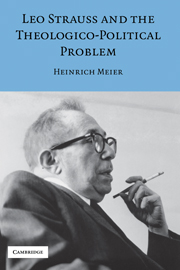Book contents
- Frontmatter
- Contents
- Preface to the American Edition
- I THE THEOLOGICO-POLITICAL PROBLEM: ON THE THEME OF LEO STRAUSS
- II THE HISTORY OF PHILOSOPHY AND THE INTENTION OF THE PHILOSOPHER: REFLECTIONS ON LEO STRAUSS
- III WHAT IS POLITICAL THEOLOGY?
- IV WHY POLITICAL PHILOSOPHY?
- APPENDIX: TWO UNPUBLISHED LECTURES BY LEO STRAUSS
- Index of Names
Preface to the American Edition
Published online by Cambridge University Press: 05 March 2013
- Frontmatter
- Contents
- Preface to the American Edition
- I THE THEOLOGICO-POLITICAL PROBLEM: ON THE THEME OF LEO STRAUSS
- II THE HISTORY OF PHILOSOPHY AND THE INTENTION OF THE PHILOSOPHER: REFLECTIONS ON LEO STRAUSS
- III WHAT IS POLITICAL THEOLOGY?
- IV WHY POLITICAL PHILOSOPHY?
- APPENDIX: TWO UNPUBLISHED LECTURES BY LEO STRAUSS
- Index of Names
Summary
Leo Strauss found his task in the recovery of political philosophy, and, like no other philosopher of the twentieth century, he engaged in the confrontation with the challenge of revelation. Both are intimately bound together: the grounding of political philosophy and the confrontation with faith in revelation are two sides of one and the same endeavor. What is at issue in both is the rational justification and the political defense of the philosophical life. For this issue, Strauss introduced the concept of the theologico-political problem.
To realize his endeavor, Strauss drew on the entire tradition of political philosophy, which he traced back to its Socratic beginning and whose history – in its continuity, as well as its turns and breaks – he made the object of penetrating studies. Strauss affirmed the tradition when he grasped philosophy as a way of life, and he returned to its Socratic origin when he reawakened the awareness that philosophy has to prove its rationality elenctically, in confrontation with the most demanding alternative. But like every philosopher, he chose the ways and means, the concepts and the rhetoric, that in his judgment were best suited for his task. These included deliberate deviations from the tradition. One was, for instance, his exposure of the exoteric-esoteric art of writing, of which philosophers had availed themselves for more than two millennia. In Strauss's oeuvre, it is given an emphasis that is without example in the history of philosophy.
- Type
- Chapter
- Information
- Leo Strauss and the Theologico-Political Problem , pp. xi - xxiiPublisher: Cambridge University PressPrint publication year: 2006



